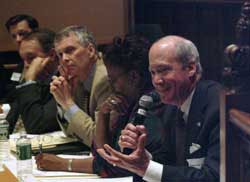Education Policy Panel Discusses the Real-World Impact of No Child Left Behind
That was the subject of a day-long panel discussion, "An Education Policy & Leadership Forum on the No Child Left Behind Act," at TC's Milbank Chapel. The April 30 event was sponsored by The Institute for Educational Leadership and The Educational Policy Fellowship Program at Teachers College. In her opening remarks, Vice President of Academic Affairs and Dean Darlyne Bailey noted that the subtitle of the event, "A Conversation About the Role of Federal Government in Promoting School Improvement On the 50th Anniversary of Brown v. Board of Education," connected the rights of access and equity resulting from the Brown decision to the intent of NCLB.
Two panels were presented consecutively (morning and afternoon) to discuss "Policy Perspectives on NCLB" and "NCLB-Will Implementation ?Trump' Strategy?" Panel participants included well-known scholars, educators, and administrators, including TC's Thomas Sobol, Christian A. Johnson Professor of Outstanding Educational Practice; Associate Dean Sharon Lynn Kagan, Virginia and Leonard Marx Professor of Early Childhood and Family Policy; and Henry Levin, William Heard Kilpatrick Professor of Economics and Education. Executive and administrative leaders participating in the afternoon panel included Eugene Hickok, Deputy Secretary-Designate, U.S. Department of Education, and Betty Sternberg, Connecticut Commissioner of Education (and TC Alumnus).
EFFECTS ON THE CURRICULUM
While the majority of panelists praised the intent of NCLB-that all children make academic progress every year-the strong emphasis on standardized tests as the instrument to measure improvement was a concern to most. A common theme articulated at various points through the day was the unintended consequence that NCLB had in narrowing of curriculum in many schools.
"NCLB is a good idea-who wouldn't want better standards, accountability, and equity of opportunity? The question is not about whether we want those things, but what form it will take," said Sobol. "The bad news is that at its core, NCLB is flawed, because it does not understand how teachers and students learn." Sobol noted that, in addition to narrowing the curriculum, the law as currently implemented is "punishing students for not achieving the things we haven't given them the means to achieve."
The standards and accountability movement, reinforced by NCLB, has also affected preschool education, said Kagan. The positive effects of this, said Kagan, is that the Early Care and Education field is becoming professionalized, and there is greater encouragement from Washington to make a larger investment in training preschool teachers. But the reality on the ground, she notes, is that roughly 50 percent of those who work with young children have no more than a high school diploma, and there is currently a 42 percent annual rate of turnover in the field. While many states have enacted some form of early learning standards, "federalization is eclipsing state standards," she said, "and the concern is that the law is narrowing the curriculum at the very time when children's minds are at their most curious."
TESTING, PRIVATIZATION
Jay Heubert, Associate Professor of Education at TC (and Adjunct Associate Professor at Columbia Law School) pointed out that while NCLB focuses on accountability and assessment, requiring end-of-year (EOY) testing, "nothing requires, or forbids, the schools to reward or punish the students" based on these tests. "It doesn't mandate that children be promoted or left back due to the results of the EOY tests," but were meant to be used as an assessment tool Heubert said. But instituting EOY tests made it convenient for states and districts to have a policy of promotion testing, providing an aura of accountability. "Being held back is disastrous for a child," he said. "The single strongest predictor of who will drop out is who was retained in their grade. I believe that NCLB will lead to its proliferation."
The law will also result in greater privatization of schooling-as it was meant to do, said Henry Levin, who directs the National Center for the Study of Privatization of Education at TC. "One of NCLB's intentions was to stimulate greater activities in the private sectors," Levin said. He noted that schools required to provide tutoring for students (an option after three years of failing to make "adequately yearly progress") are paying for private tutoring sessions, as well as seeking out academic and test prep software from commercial firms. Levin pointed to the long-term trend, which could see a lot of public education money going into private hands: "Over time, we're going to see every school in America ?fail.' By 2014, we're going to hear that public school's can't do the job, but that private schools can, based on ?research'-that leads to vouchers," he said.
During both of the day's panels, speakers noted that a positive aspect of NCLB is the requirement that schools report test results using disaggregated data (by race and other factors).
Eugene Hickok, representing the U.S. Department of Education, tied the efforts of NCLB to the ideas that launched Brown v. Board of Education struggle. Calling the Brown decision "easily the most important educational, but also legal and social moment in our nation's history," Hickok added, "but the work of Brown is not complete. Through NCLB, you can't ignore data" that exposes achievement gaps, he said. Hickok, a leading spokesperson for the Bush administration's education policies, said, "If Brown was about access, NCLB is about success."
Published Thursday, Aug. 12, 2004
